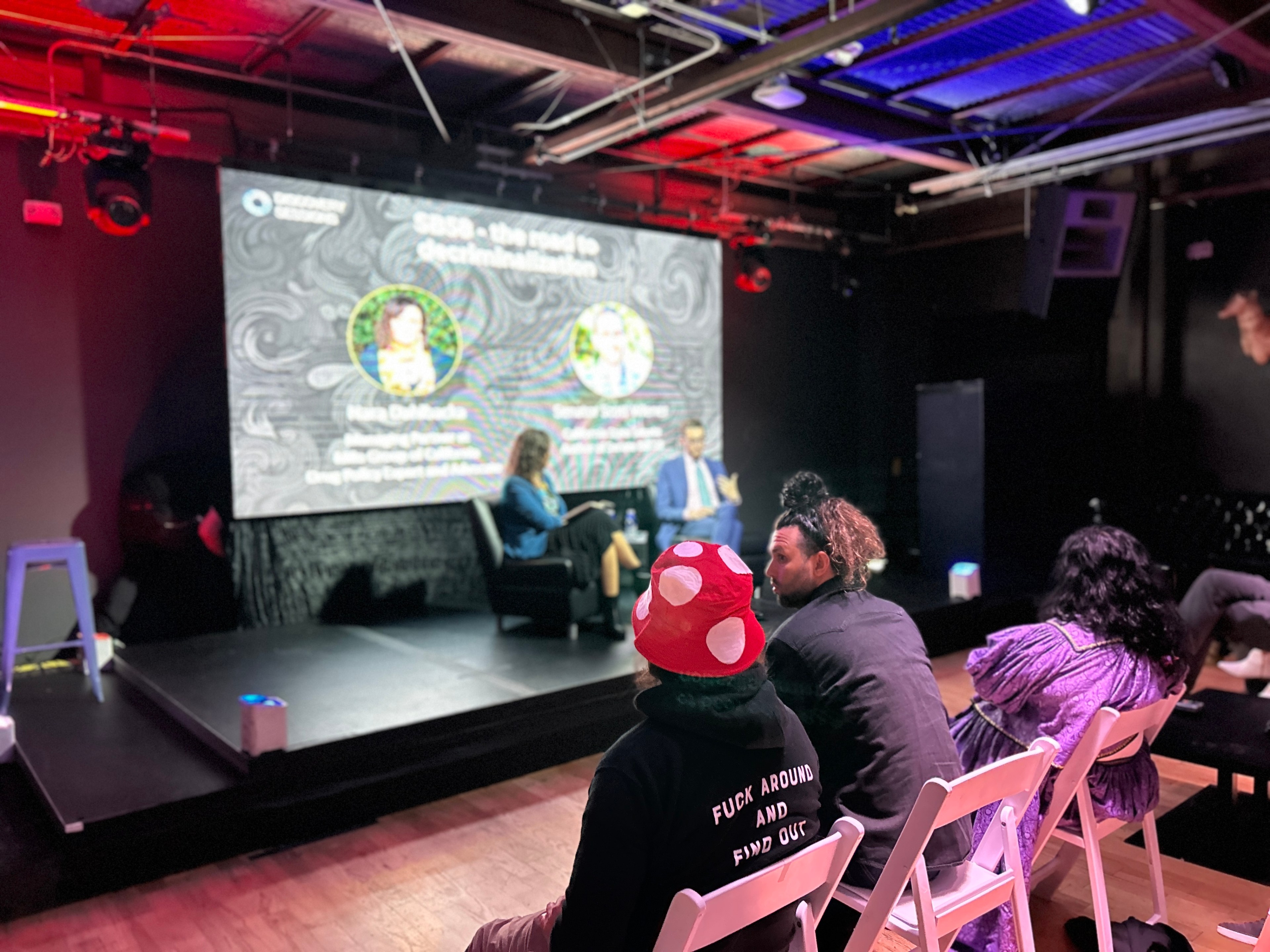After a tortuous route through the California Legislature, a bill that would decriminalize so-called magic mushrooms and plant-derived psychoactive substances is now on Gov. Gavin Newsom’s desk. He has another two weeks to sign it.
People can already buy mushroom edibles in San Francisco with minimal effort, but decriminalization would mark a major shift for the state that once filled its prisons with people convicted of nonviolent drug offenses.
While waiting for the governor to make up his mind, the bill’s author, San Francisco state Sen. Scott Wiener, spoke with political activist Nara Dahlbacka on Thursday evening at the Midway, a venue in the city’s Dogpatch neighborhood, as part of a periodic salon on psychedelics called the Discovery Sessions. Here are six takeaways from the discussion.
What Does Wiener’s Bill Do?
Wiener’s bill, SB 58, passed in both chambers of the state legislature this year. It decriminalizes four naturally derived psychedelic compounds: psilocybin (mushrooms), ayahuasca (DMT), ibogaine and mescaline—as long as it isn’t derived from peyote. That’s because many Indigenous cultures regard it as sacred, and “peyote tourism” puts the cactus at risk of extinction.
Decriminalization refers to the removal of legal penalties for the personal or “facilitated” use, exchange and cultivation of the four naturally occurring psychedelics. Wiener’s bill would empower a state health agency to create a regulatory framework, and, if Newsom signs it, it would take effect on Jan. 1, 2025.
Notably, decriminalization is not the same as legalization, which would permit the sale of these substances. Wiener’s bill does not allow for that.
SB 58 is part of a broader push to rethink California’s approach to drugs, one that prioritizes safety and education over punitive enforcement—which has failed to put a dent in the prevalence of addiction or end the overdose crisis.
“We went a little hog-wild on drugs,” Wiener said on Thursday. “The country developed an addiction to longer and longer sentences.”
California Is the First State To Attempt Decriminalization This Way
San Francisco, Oakland, Portland and Denver have all decriminalized the possession of certain psychedelics within their city limits, meaning enforcement is now the lowest priority for local police. Activists in Oregon and Colorado are pushing for statewide decriminalization through ballot initiatives, but only California is moving to do so via its state legislature.
Wiener compared the legislative process to a sea turtle hatching eggs on the beach.
“A month later, a thousand little turtles are born,” he said, “and when the birds come in, you have to shepherd them to the ocean.”
Wiener’s ‘Biggest Heartbreak’? Ketamine
Earlier versions of the bill covered a wider range of substances, including MDMA, LSD and ketamine. Although it’s scientifically inaccurate, the narrative about ketamine as a date-rape drug was strong enough that its inclusion risked torpedoing the entire bill. Law enforcement had “never been bombastic” in their opposition, Wiener said, but threatened to mobilize against it if it weren’t restricted to naturally derived compounds.
“If we didn’t limit it to plant-based, they would go to war against the bill,” he said. “The bill had passed every committee and every floor vote by a bare minimum. So we limited it, and they kept their word.”
Support and Opposition Sometimes Come From Unexpected Places
Wiener said he met with a group of mothers from affluent, progressive Bay Area communities who strongly oppose decriminalization because they lost children to adverse drug reactions and overdoses. He also acknowledged that opposition to liberalizing drug laws can sometimes piggyback onto NIMBYism, as people don’t want a treatment center in their neighborhood.
Perhaps more surprisingly, Wiener said several right-leaning legislators joined the cause after hearing testimony from veterans about how psychedelics helped treat their PTSD.
“We got three very conservative Republicans in the Assembly to vote for it, and if we had needed the votes, I think a few more would have,” he said. “A lot of why we’ve gotten this far is combat veterans and first responders. … I’ve seen colleagues who were quite opposed and then met with veterans and came over because it was so compelling.
He Doesn’t Think Sacramento Would Ever Legalize All Drugs
Even for issues that don’t polarize the electorate, a ballot initiative requires spending $5 million to $10 million just to find 540,000 qualified signatures to put a measure before California voters. That doesn’t include the $40 million to $500 million for the actual fight, depending on the strength of the opposition.
While there is a volunteer-driven campaign to legalize mushrooms circulating around the state, Wiener said such an effort was quixotic, as initiatives driven by unpaid labor had not made the ballot since the 1980s. Legalizing all drugs would likely be an even tougher fight.
Regarding the possibility that Sacramento could ever push for full legalization, he was even more pessimistic.
“I don’t think it’s possible in the legislature, now or in the future,” Wiener said.
If Newsom Vetoes the Bill, Its Future Is Uncertain
Wiener stated that he’s unsure about what he’ll do if Newsom doesn’t sign the bill before the constitutionally mandated Oct. 14 deadline. He did not commit to taking the matter up again in the next legislative session.
“If he vetoes it with a message, then we should look at that bill and consider reintroducing it,” Wiener said. “It just depends on what he says.”
At the same time, he encouraged people not to read anything into Newsom’s delay, as the governor has a huge number of bills on his desk and many advisers weighing in. Polling in California has been strong, he added, and Newsom has made comments about the bill that “that were not negative.”
Later, when asked by The Standard if he was optimistic about SB 58’s chances, Wiener had this to say: “I think it’s 50-50. This could be a late one. I think [Newsom] is probably struggling with it.”
